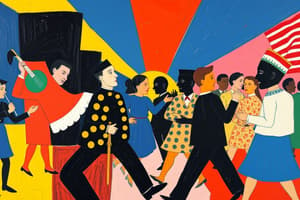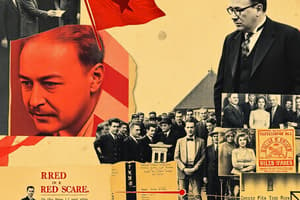Podcast
Questions and Answers
What is Nativism?
What is Nativism?
- Isolation from world affairs
- Anarchist political movement
- Prejudice against foreign-born people (correct)
- Support for immigrants
What does Isolationism refer to?
What does Isolationism refer to?
- Engagement in international conflicts
- Pulling away from world affairs (correct)
- Involvement in world trade
- Promotion of global cooperation
Who were Sacco and Vanzetti?
Who were Sacco and Vanzetti?
Italian immigrants and anarchists arrested for robbery and murder.
What was the Red Scare?
What was the Red Scare?
What were the Palmer Raids?
What were the Palmer Raids?
What was the Quota System established by the Emergency Quota Act?
What was the Quota System established by the Emergency Quota Act?
Who was Warren G. Harding?
Who was Warren G. Harding?
What was the Washington Naval Conference?
What was the Washington Naval Conference?
What did the Kellogg-Briand Pact do?
What did the Kellogg-Briand Pact do?
What effect did the Fordney-McCumber Tariff have on U.S. imports?
What effect did the Fordney-McCumber Tariff have on U.S. imports?
What was the Dawes Plan?
What was the Dawes Plan?
What scandal involved the secret leasing of public lands in the Teapot Dome Scandal?
What scandal involved the secret leasing of public lands in the Teapot Dome Scandal?
What is Normalcy?
What is Normalcy?
What did the 18th Amendment establish?
What did the 18th Amendment establish?
What did the Volstead Act establish?
What did the Volstead Act establish?
What was the purpose of the 21st Amendment?
What was the purpose of the 21st Amendment?
What were Speakeasies?
What were Speakeasies?
Who were Bootleggers?
Who were Bootleggers?
What is Fundamentalism?
What is Fundamentalism?
Flashcards are hidden until you start studying
Study Notes
Nativism
- Prejudice against foreign-born individuals, especially after WWI due to distrust towards immigrants from enemy countries.
Isolationism
- A strategy of pulling away from global affairs, emerging from the exhaustion and disillusionment following WWI.
Sacco and Vanzetti
- Italian anarchists accused of robbery and murder; faced conviction largely based on ethnic bias with insufficient evidence.
Red Scare
- A period of widespread fear regarding communism, exacerbated by bomb threats to government and business leaders from radical groups.
Palmer Raids
- A government initiative led by Palmer and Hoover targeting suspected communists, anarchists, and socialists, often bypassing civil rights and legal protocols.
Quota System
- Implemented by the Emergency Quota Act, limiting immigration by establishing a cap based on the demographic of immigrants in 1890, disproportionately affecting Eastern and Southern Europeans.
Warren G. Harding
- Republican president involved in significant events such as the Washington Naval Conference, Fordney-McCumber Tariff, and the Teapot Dome scandal. Promoted limited government roles in societal reforms.
Washington Naval Conference
- The first disarmament conference where major naval powers agreed to halt warship production for ten years, excluding Russia.
Kellogg-Briand Pact
- An international agreement that condemned war as a national policy, but lacked enforcement mechanisms.
Fordney-McCumber Tariff
- Raised tariffs on U.S. imports to 60%, exacerbating the financial struggles of foreign nations and protecting U.S. businesses.
Dawes Plan
- A financial plan designed to stabilize post-WWI Europe through American loans to Germany, ensuring reparations payments to Britain and France, while creating tensions over financial responsibilities.
Ohio Gang
- A group of Harding's close friends who were appointed to influential positions, often engaging in corrupt practices for personal gain.
Teapot Dome Scandal
- A major political scandal involving the secret leasing of federal oil reserves to private companies by Secretary Albert B. Fall, resulting in bribery charges.
Albert B. Fall
- First U.S. Cabinet member convicted of a felony for his role in the Teapot Dome scandal involving oil reserves.
Normalcy
- Harding's vision of returning to simpler times, prior to the progressive reforms and the upheaval caused by WWI.
Calvin Coolidge
- Continued policies of high tariffs and international financial arrangements such as the Kellogg-Briand Pact and Dawes Plan during his presidency.
Prohibition
- The legal ban on the manufacture, sale, and transportation of alcoholic beverages, marking a significant social shift.
18th Amendment
- Constitutional amendment that initiated Prohibition in the United States.
Volstead Act
- Legislation establishing the framework for enforcing Prohibition, though it lacked sufficient funding and resources.
21st Amendment
- Repealed the 18th Amendment, effectively ending Prohibition.
Speakeasy
- Illicit bars that emerged during Prohibition, accessible only through a password or membership; popular across various social classes.
Bootlegger
- Individuals engaged in the illegal smuggling and sale of alcohol during Prohibition, often linked to organized crime.
Studying That Suits You
Use AI to generate personalized quizzes and flashcards to suit your learning preferences.




